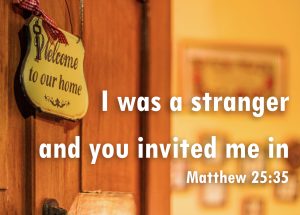By Raed AbuJries
“I was a stranger and you invited me in.” These words, from Matthew 25:35, are normally perceived as a guiding principle that urges us to welcome and embrace those who are different from us. And while it will always apply as a call to kindness and compassion, this verse takes on a new depth when viewed through the lens of a personal experience.
When I immigrated to the United States at the age of 18, I quickly became familiar with the concepts of acceptance and hospitality and the transformative power they can hold. As a child, I was taught this biblical verse as a reminder of the values I should uphold as a Christian, mainly, treating others with the same care we would extend to Jesus himself. However, it wasn’t until I started my own immigration journey that the true meaning of being a stranger came into focus. Suddenly, the vulnerability of being in a new and foreign environment quickly revealed to me the significance of this verse.
Arriving in the United States, I had a simplistic and fragmented knowledge of American culture and society, based mainly on what I’ve seen in movies and on television. And while I had heard stories of racial tensions and political divides, the particulars of these issues remained vague. As I started settling into my new life, I encountered a spectrum of responses from the people I met. Some displayed wonderful kindness the moment I met them, offering an open heart that reflected the teachings of embracing strangers. Others maintained a neutral stance, neither overtly warm nor hostile. And then, there were those who greeted me with suspicion and aggression, revealing more of the complexity of human nature and the wide spectrum of attitudes held by people in America.
Every interaction was like a roll of the dice, keeping me always on my toes. Each person’s perception of me seemed to be influenced by their own experiences and biases. And for a new immigrant, those biases were not easy to predict. I was struck by those who went out of their way to make me feel at home, displaying a hospitality that went far beyond being polite. Their acts of kindness, having known nothing of my story or background, ignited a spark within me. They inspired me to strive to meet their expectations and validate their goodwill, by becoming an active and positive contributor to my new community.
These positive experiences highlighted the transformative power of acceptance and hospitality. Acts of kindness, especially extended to strangers, possess the potential to shape their lives and foster a sense of belonging. The kindness I encountered from individuals who embraced me without reservation or prejudice prompted me to channel their goodwill into personal growth and positive engagement with my new environment. Their actions taught me that an accepting community can be a catalyst for self-improvement and meaningful contributions.
On the other hand, it was inevitable to be occasionally met with hostility and suspicion, reminding me of past experiences I endured in the country I came from. Having lived under a military occupation, I was no stranger to prejudice and aggression. I was familiar with the dynamics of being treated as an outsider. Such treatment had taught me that the judgment and aggression of others often arise from ignorance or misguided fear.
But unlike the experiences of acceptance, these negative encounters did not inspire within me a desire to prove myself to those who couldn’t see beyond their biases. Instead, I became more convinced that through acts of kindness and a willingness to extend a hand, we can shape an inclusive society where differences are welcomed. I have personally seen the profound impact of “inviting people in”, not only on individuals seeking refuge in a new land but also on the communities that welcome them. Embracing strangers isn’t just about following a religious mandate—it’s about enriching lives, dismantling barriers, and creating a harmonious community where everyone’s potential can flourish. As I continue to integrate into my adopted home, I am driven to embody the spirit of acceptance that was extended to me, ensuring that others who follow in my footsteps find the same warmth and hospitality that I experienced.
